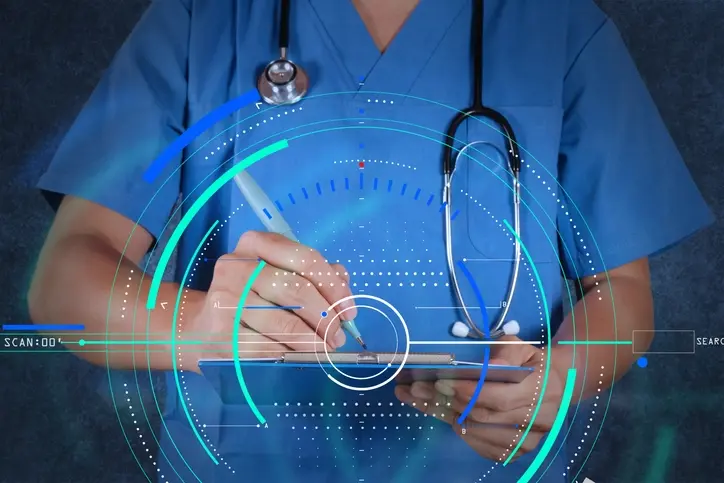The Ultimate Solution for Healthcare Staffing: Vendor Management Systems
Explore how healthcare staffing is transforming vendor management systems in the industry.

Explore the rationale behind integrating healthcare VMS into your operations, along with essential strategies and top-notch practices for improving business efficiency.
Healthcare Vendor Management Systems (VMS) are specialized software applications created to simplify and automate various processes, helping managers manage the overwhelming amount of data they face. These systems are specifically tailored to meet the unique needs of each healthcare facility, including hospitals, clinics, and other medical institutions.
Healthcare VMS streamlines the flow of communication between healthcare providers and patients, fostering seamless care coordination while minimizing unnecessary data complexity and interruptions in the care process. These systems can effectively manage patient data, appointments, medical records, billing, and other administrative tasks to boost operational efficiency, enhance patient care, and ensure adherence to regulatory standards. With healthcare professionals facing heavy workloads and limited resources, simplifying data and analytics processes is crucial to ensure a smooth and efficient workflow. Given the demanding nature of healthcare environments where patient well-being takes precedence, implementing a VMS system can uphold patient care as the primary focus.
To better understand Healthcare VMS, it is essential to explore their features, functionalities, and benefits in detail.
Implementing VMS in healthcare facilities is a pressing need due to the industry's increasing complexity and demand. With a growing patient population, expanding treatment modalities, evolving regulatory standards, and a deluge of information, managing healthcare facilities has become more challenging than ever. Healthcare VMS is a powerful tool that can simplify this process and help healthcare professionals navigate these intricate challenges.
Healthcare VMS offers a significant advantage by automating workflows. It handles administrative tasks such as patient check-ins, appointment scheduling, and record-keeping. This automation frees healthcare professionals from the burden of paperwork and administrative duties, allowing them to focus more on providing quality patient care.
A key difference in a Healthcare VMS is that it's crucial in enhancing the overall patient experience by improving operational efficiency. It enables online appointment scheduling, telemedicine consultations, and secure messaging, offering patients quicker and more convenient access to healthcare services. Especially in challenging times, these enhancements in accessibility and convenience can significantly reduce patient stress levels and boost patient satisfaction.
Thirdly, Healthcare VMS provides valuable insights and analytics by analyzing large volumes of healthcare data. A data-driven approach not only optimizes operations for better patient outcomes but also empowers healthcare facilities to make informed decisions and identify trends. By leveraging data analytics, healthcare providers can enhance the quality of care and improve patient outcomes effectively, making decision-makers feel confident and informed.
In light of these considerations, healthcare facilities must assess how implementing VMS can boost operational efficiency, enhance patient care, and stay ahead in the ever-changing healthcare environment. This will address current challenges and propel facilities toward future success by harnessing technology to its maximum potential.
Implementing Healthcare VMS offers numerous benefits for healthcare facilities. Some of the key advantages include:
Improved Efficiency: Healthcare VMS automates various tasks to reduce manual effort and revolutionizes how healthcare providers streamline their operations to minimize errors and focus on delivering quality patient care. By enabling seamless processes such as online appointment scheduling, electronic billing, and efficient inventory management, these systems pave the way for new methods of operational excellence in healthcare facilities.
Enhanced Patient Care: Healthcare providers can access precise and current patient data, empowering them to make well-informed decisions and deliver quality care. Furthermore, it facilitates secure communication and collaboration among healthcare teams to ensure a smooth care process.
Cost Savings: By automating processes and reducing paperwork, Healthcare VMS can help healthcare facilities save costs associated with manual tasks, such as printing and storage. It also minimizes human errors like improper billing or insurance to optimize management, saving costs.
Improved Data Security: An adequate VMS implements robust data protection measures to ensure the security and confidentiality of patient data. With vast amounts of data flowing through healthcare systems, it is essential to protect patient information. A VMS helps healthcare facilities comply with privacy regulations, such as HIPAA, and prevents unauthorized access to sensitive information.
These are just a few examples of the benefits that healthcare facilities can achieve by implementing Healthcare VMS. The specific advantages may vary depending on the system chosen and the unique requirements of the facility.
As technology continues to advance rapidly, the future of VMS in healthcare facilities appears incredibly promising.
The integration of Artificial Intelligence (AI) into VMS streamlines tasks and enhances the overall delivery of healthcare services. By automating repetitive and time-consuming processes, AI enables healthcare professionals to focus on providing personalized and quality care to patients.
Furthermore, VMS plays a crucial role in facilitating telehealth services, offering patients increased access to healthcare and greater flexibility in receiving medical care. Telehealth services have become increasingly important, especially during the pandemic, as they provide a convenient and safe way for patients to consult with healthcare professionals remotely. The integration of VMS with telehealth services improves patient satisfaction and expands the reach of healthcare facilities to serve a broader population.
To summarize, the future of Healthcare VMS is promising, with continuous innovation and technological advancements shaping how healthcare is delivered and experienced. From AI integration to telehealth services, VMS is at the forefront of revolutionizing healthcare delivery and enhancing the overall patient experience. Embracing these advancements allows healthcare facilities to stay ahead of the curve and provide high-quality, efficient, and patient-centred care for years.

Explore how healthcare staffing is transforming vendor management systems in the industry.

Discover how implementing a Vendor Management System (VMS) can revolutionize healthcare operations, ensuring efficiency and compliance.

Discover how advanced Vendor Management Systems (VMS) are revolutionizing the management of shift and assignment workers in the healthcare industry,...